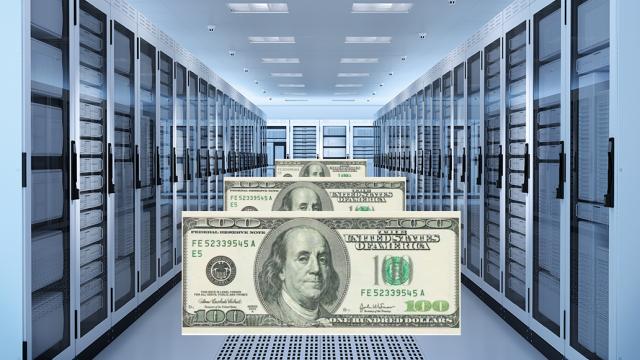On Monday, we learnt that the NSA is recording every single phone call in the Bahamas and storing the data for a month. This news arrives just six weeks after we learned that the NSA was recording every single phone call, text and email in Iraq. In fact, the spy agency is engaged in similar efforts in five different countries around the world. So how many taxpayer dollars does that come out to?
A whole lot. Data storage, especially on that kind of scale, costs a ton of money. It’s not just the server space itself, either. That part is actually pretty cheap. All of the other costs associated with running a data center — electricity, cooling, real estate, support, warranty — add up quickly. And that’s before you put humans into the equation.
In an attempt to provide some clarity about the cost of the NSA’s Caribbean adventure, we reached out to Zayo, a leading provider or bandwidth infrastructure services. These are the guys that build the actual tubes that keep the internet on and all of us connected, so they know a thing or two about dealing with massive amounts of data in real time. They also know a little bit about dealing with governments around the world.
The formula Zayo offered up is relatively simple, though the numbers are necessarily ballpark figures. (Remember: the NSA is an infamously secretive spy agency.) First, we’d need to know how many phone calls the NSA is actually handling. According to Monday’s report in The Intercept, it’s “over 100 million call events per day.” Shane Painter, the director of IT infrastructure and operations at Zayo, told Gizmodo that a single call would typically create “on the order of 64 kilobytes and 1 megabyte of data, perhaps more depending on the format and quantity of metadata included.” Simple maths reveals that the Bahamas’ phone calls would require between 61 and 95 terabytes of storage per day.
So how much does it cost to store all that? We know that the NSA maintains its own data centres, but for the sake of transparency, let’s work with industry figures. Painter told Gizmodo that “all non-human operating costs (electrical, cooling, ‘rent’ on the data center space, support and warranty), typically falls between $US0.015 [per gigabyte] per month on the very low end (archival, slow, SATA) storage, to $US0.15 per month on very fast, all SSD SAN storage, given a 36 month lifespan.” The longer the data is stored, the cheaper it becomes. But since the NSA is apparently deleting the data after one month, it’s actually more expensive. Painter said he believes a job like that would require a system capable of “constant deletion,” and that system is the expensive SSD SAN storage.
Time for more maths! Using that $US0.15 per gigabyte per month figure, we can calculate the cost of a single day’s worth of recordings in the Bahamas at $US9,375 on the low end and $US14,646 on the upper end. Don’t forget that they’re doing this for a month at a time. So in any give 30 day period, the NSA spends between $US281,250 and $US439,440 recording random phone calls in the Bahamas. Those are taxpayer dollars, of course.
That adds up to $3.4 million a year, at a bare minimum, to record every phone call made in the Bahamas. It’s probably closer to the upper end of $5.3 million a year.
Now, remember the NSA is reportedly doing this in five different countries around the world, bringing our total ballpark just for phone call recording into the tens of millions of dollars.
In all likelihood, the NSA’s supposedly ultra high-tech data center can probably cut some corners. Even still, those hundreds of thousands of dollars above simply account for the equipment. For the much more expensive, often human task of processing the data, it costs extra. The Intercept report tells us that the agency has an eight-year, $US51 million contract with contractor General Dynamics for data processing, another six million dollars a year.
So you take the numbers above, add in a little extra for the federal government’s bad habit of wasting millions for no reason, you get quite a sum. While it seems like a lot, remember that this is just one operation from an agency that operates on a global scale, drawing money from a so-called “black budget” of over $US50 billion. And since recording entire countries’ phone calls adds up to such a small fraction of that budget, it’s a little mind-boggling to imagine the kind of incredible scale the spies are operating on.
